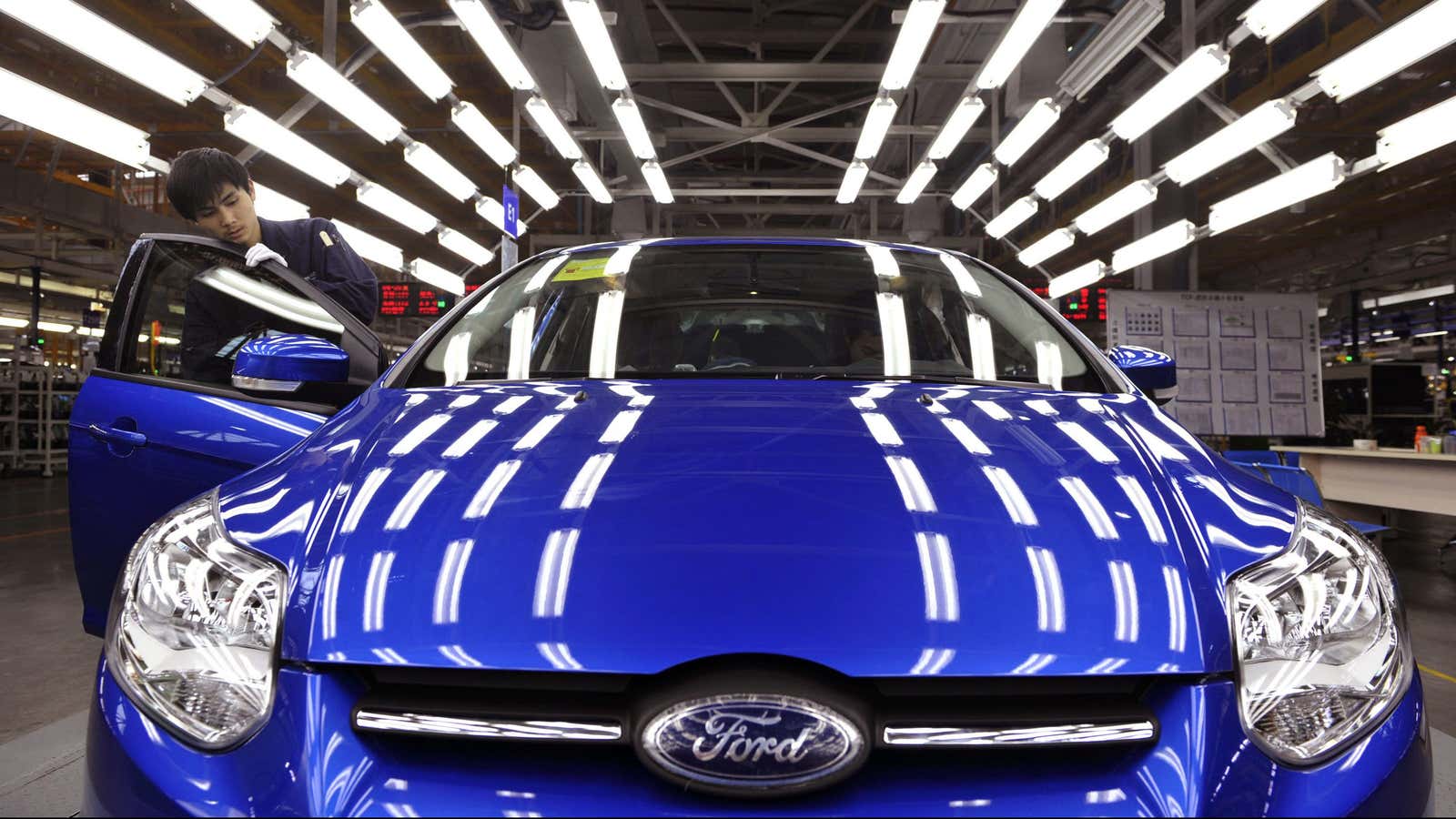Automaker Ford said June 20 it won’t move production of its Focus model from the US to Mexico after all. The company now plans to make the cars in China, and ship them to the US.
It’s an eyebrow-raising decision for several reasons. Making the sedan in neighboring Mexico would be more convenient for Ford, enabling the company to avoid the high costs of shipping the cars from Asia. Ford was also subjected to the wrath of then-presidential candidate Donald Trump when it originally announced the move to Mexico. Why risk further inflaming presidential anxieties over the outsourcing of US manufacturing and trade?
The move also raises questions about whether the advantages American manufacturers have long enjoyed under the North American Free Trade Agreement (Nafta) are no longer enough to make them competitive with those operating in regions of the world where labor is cheaper. The trade deal between the US, Mexico, and Canada essentially dissolved trade tariffs between the three countries, creating a giant, three-country zone in which the many parts that go into a car can flow seamlessly. That has given the car industry the flexibility to set up production wherever it makes most economic sense.
But Ford’s rationale becomes clearer by looking at two charts that show how Focus sales have plummeted in the US as American drivers flock to crossover utility vehicles and pickup trucks:
Ford decided to stop producing the Focus at its Wayne, Michigan plant in the first place in order to build more profitable models there.
The original plan was to build a new factory in Mexico. But with Focus sales still diving in the months after the decision was made, the company ditched that idea in favor of adapting one of its existing Mexican plants to produce the Focus.
Now Ford says it has an even cheaper solution: It will make Focuses for the US market in China, where it already produces the model for Chinese drivers. That will increase shipping costs, but it will also free up a significant amount of cash: it says it’s saved $500 million by scrapping the Mexico plant, and another $500 million from not refitting the Mexican plant to accommodate Focus production. The bulk of those savings, $900 million, will go towards upgrades to a Kentucky plant so that it can make SUVs, Ford said.
The company’s chief executive Joe Hinrichs is touting this as the kind of national win that Trump has celebrated in the past. “We can reinvest in the business, including exciting things that we’re working on in autonomy and electrification, and a lot of that work is done right here in the US,” Hinrichs said in a conference call with reporters.
Focusing on China also makes good business sense for Ford. It’s an enormous market, and one in which Ford needs to make more inroads. The company has been lagging behind competitors such as General Motors and Volkswagen in China, and so far this year, its sales in that country have been mostly down compared with the previous year.
Still, don’t expect China to suddenly become a top US supplier of cars as it is of, say, toys and T-shirts. Because cars are so bulky, auto manufacturers usually make them close to where they sell them. Shipping them long distances only makes sense in certain cases: “It has to do the scale,” said Reid Wilk, automotive strategy partner at consulting firm PwC. “If you happen to be selling a car globally and only making 300,000, how expensive is it to make in every location?” As Wilk points out, it can become very expensive in this scenario to make cars in different regions. But if sales are closer to a million vehicles, that’s more than the capacity of a single plant, and it might make sense to spread production around the world.
For now, Ford’s decision isn’t a sign that the manufacturing setup created by Nafta is obsolete. “North America is a highly integrated production system with the three countries totally, inextricably intertwined with each other,” says James Rubenstein, a professor at Miami University in Ohio who studies the auto industry.
That could change, though, if the basic principles of Nafta are modified when its three members sit down to renegotiate it. Talks could start as early as August.
